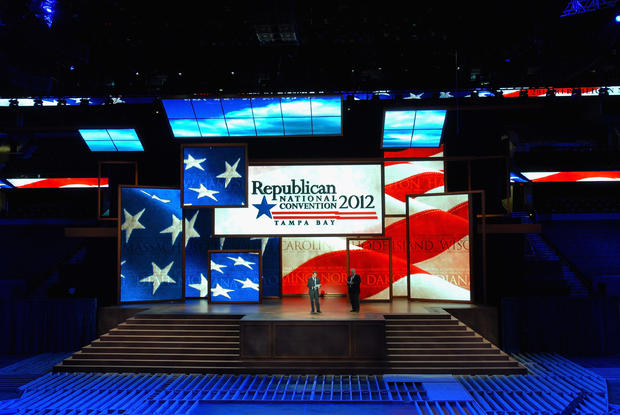GOP strives for diversity in convention lineup
(CBS News) The Republican National Convention isn't just a chance for Republicans to try to rally voters around their presidential ticket and down-ballot candidates. It's also an opportunity to portray their party as an inclusive one that welcomes all different types of Americans.
According to a Gallup survey last year, the GOP is more white and slightly more male than the population at large. The survey of adults found that 53 percent of Republicans and Republican-leaners are male, compared to 49 percent of adults at large. It also found that 87 percent of Republicans and Republican-leaners are white, compared to 72 percent of the adult population overall. Hispanics were found to make up 13 percent of the adult population compared to 7 percent of the GOP, while African-Americans were 11 percent of the adult population compared to 3 percent of the GOP.
Polls show that President Obama has an advantage over Mitt Romney among both women and minority groups. The latest Quinnipiac University/CBS News/New York Times poll of battleground states found that the president leads by 12 percentage points among female voters in Florida, by 13 points in Ohio and by 9 points in Wisconsin. Polls also show the president holds a wide lead among minority voters, including Hispanics, a growing voting bloc that Romney has acknowledged the Republican Party needs to win over. If the party does not, he was overheard saying at an April fundraiser, it "spells doom for us."
Republicans have thus far announced 72 speakers for their convention in Tampa. Forty-three of those speakers - 59.7 percent - are white men. Nine of the speakers, or 12.5 percent, are Hispanic. Five of them, or 6.9 percent, are African-American. Only 27.7 percent of the speakers are women.
There are two Indian-Americans on the list, Governors Nikki Haley of South Carolina and Bobby Jindal of Louisiana, as well as at least one mixed-race American: California congressional candidate Ricky Gill, whose parents are immigrants from India and Uganda.
Among the groups that do not appear to be represented on the current convention speakers list: Asian-Americans, Muslims, and openly gay Americans. Asian-Americans represented 5.8 percent of the U.S. population in 2011.
Some of the speakers will be appearing during the day - when most Americans will not be watching - and some are playing relatively minor roles, such as offering a benediction. So it makes sense to look at which speakers the party has decided to put forth in prominent slots during the four evenings that the convention is set to take place. (Some of the speakers have not been scheduled; this calculation is based on the schedule as it now stands.)
This list has more minorities and women on it than the speakers list overall. Of the 41 speakers, 22 are white men - that's 53.7 percent - and 14 are women, at 34.1 percent. The list includes seven Hispanics (17.1 percent) and four African-Americans (9.76 percent), as well as both Indian-Americans.
The prime-time speakers list includes Utah's Mia Love, who would be the first black, female Republican in Congress if elected. It also features four of the most prominent Hispanic Republicans in American politics: Florida Sen. Marco Rubio, Puerto Rico Governor Luis Fortuno, New Mexico Governor Susana Martinez and Texas Senate candidate Ted Cruz.
CBSNews.com will break down the speakers at the Democratic National Convention once more names are released. Democrats have thus far announced 21 speakers (not including the president and vice president), 12 of whom are women. The party has made clear that its selection of speakers is designed to appeal to female voters as part of a strategy to portray Republicans as hostile to women, particularly on health issues. Democrats announced 10 female speakers on Wednesday, including Georgetown University law student Sandra Fluke and NARAL Pro-Choice America president Nancy Keenan.
"This convention will define the election as a choice between two very different paths for our nation, particularly when it comes to the health and economic security of women and middle-class families," DNC spokeswoman Melanie Roussell told CBS News concerning the Wednesday announcement. "The speakers announced today were chosen because they can personally define that choice."
Editor's note: A reference to some of the speakers scheduled for Monday was changed after the convention organizers announced that Monday's session was canceled due to Hurricane Isaac.
